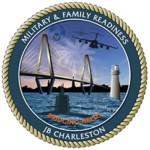Deployment Support
INSPIRE, COLLABORATE AND INNOVATE...
Mandatory Deployment Briefings are held every Tuesday & Thursday.
Pre-Deployment Briefs are mandated for deployers and we encourage your spouse to attend as well!
Welcome Home Reintegration Briefings are also mandated for returning deployed members and again spouses are welcome and encouraged to attend.
Members must complete briefings within 72 hours of return.
- Tuesdays:
Pre-deployment is 1500 - Reintegration is 0900
- Thursdays:
Reintegration is 1500
Pre-Deployment is 0900
Register Here
The workshops last approximately 60 minutes. Workshops include information about Legal, Finance, Military & Family Life Counselors, Helping Agencies, and the Transition Assistance Program. Spouses and children are highly encouraged to attend.
The Military & Family Readiness Center promotes family preparedness through education and participation in readiness support. Families are also provided assistance during extended absences of the military member, emergencies, and natural disasters. Materials are provided on how to prepare for deployment, cope with separation, and come back together as a family. M&FRC staff works through units, spouse support groups, and with individuals to provide information and assistance.
Air Force Aid Society(AFAS) provides emergency financial assistance for deployed affected family members.(Power of Attorney needed for non-military spouses) Hearts Apart is a vital element of deployment readiness activities hosted by the Military & Family Readiness Centers (M&FRC) helping families stay connected to Airmen. Hearts Apart activities focus on deployment support for Airmen & families during pre- deployment and sustainment. Hearts Apart also includes support to families separated due to extended TDY lasting 30 days or more as well as to families whose Airman is on a remote assignment. The M&FRC hosts a quarterly Hearts Apart family-oriented event that promote sense of community, quality of life and family resiliency.
Key Spouse Program – The Key Spouse Program is the official family readiness program that supports Airmen and their families during deployments, separations and emergencies as well as enhancing and encouraging regular communications between unit’s leadership and families designed to enhance readiness and establish a sense of community. The program helps leadership, commanders and First Sergeants, connect with unit families through a network of volunteers who work to keep accurate information flow.
To find out more about the Key Spouse Program, contact the Military & Family Readiness Center and/or visit Key Spouse & Ombudsman Support – Charleston Military and Family Readiness (jbcmfr.com)
Children also experience separation. https://militarykidsconnect.health.mil/ is a website that provides support to children ages 9-17. The highly interactive website helps children cope with stress, changing responsibilities, and concern for the safety of their parents.
FAMILY DEPLOYMENT CHECKLIST
Create a long-range budget to include once-a-year expenses
Establish allotments, up to four months in advance if possible
Update or create a living will
Locate important records, what and when bills are due
Insurance – car, life, renters, or home. When are premiums due
Power of attorney – do you need a general or specific POA
Telephone/Communication
Duplicate calendars: note special events, birthdays, and school activities. Keep
each other updated, Gifts: buy in advance and leave with a friend or family
member for anniversaries, birthdays and special events
Establish rules regarding children’s discipline, chores, curfew, etc.
Recognize and accept the range of emotions you are feeling, talk about them
with your spouse
First sergeant’s name and phone number: keep this information close at hand for
emergencies and current and accurate information
Military and Family Readiness Center: find out how their programs and services
can help you survive deployment
Develop a good support system: family, friends, church, school, co-workers,
family readiness support groups and hobbies
Plan once-a-week outings for the parent manning the home front
Plan family days with quality time and no interruptions
Establish a routine that can be maintained before, during and after deployment
Plan family activities that help maintain the deployed parent’s presence — send
photos, map your unit’s itinerary, videotape everyday activities

843-963-8883
The utilization of non-government websites within our website does not imply nor intend any federal endorsement.